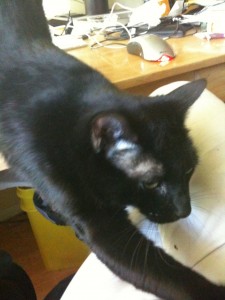
 Yesterday I taught a day-long workshop on rewriting and editing one’s work for Clarion West. I usually do this as a two hour online workshop, so it was interesting to take the class and get a chance to really flesh it out, particularly since I can use this version to create an on-demand version.
Yesterday I taught a day-long workshop on rewriting and editing one’s work for Clarion West. I usually do this as a two hour online workshop, so it was interesting to take the class and get a chance to really flesh it out, particularly since I can use this version to create an on-demand version.
As with all writing advice, mileage will vary according to the individual. The best thing as a writer that you can do is to pay attention to your own process and make it more effective. Experiment with lots of things, identify the practices that work, and incorporate them into your process. Keep experimenting, mixing things up a little, every once in a while, writing to the sound of whale songs, or dictating while hiking, or using a pen rather than the keyboard — it doesn’t matter what as long as you keep testing things in a way that lets you grow as a writer.
...

Some people are taking the class in order to edit their own stuff, others to edit for other folks, a couple for a combination of that. We talked about what a developmental edit is intended to do, and how it’s different from a copy-edit. In fact, you want to avoid copy-editing (other than a couple of cases which I’ll get to in a minute) because often that sentence you’re tinkering with will end up discarded or substantially revised in the final version.
Honing your editing ability to where you can trust it is one way to free yourself up when writing. Instead of listening to the internal editor telling you that sentence isn’t perfect or that you need to check that name on Wikipedia before using it, you can assure that editor it will get its chance during the revision process and go on writing.
...
I’ve been reading Donald Maass’s excellent, excellent book Writing the Breakout Novel (which is, unfortunately, not available on the Kindle so I actually had to do the archaic order and wait for a hardcopy thing) and it’s at a perfect time for me since I’m beginning the second pass at the current project.

I find it handy to do this sort of pass. Last time, when revising Phat Fairy, I used a list from Holly Lisle and went through scene by scene, checking for criteria like what got accomplished, were there any loose ends, what characters appeared, was there a sensory moment, was there character development for at least one character. I did something similar with The Moon’s Accomplice, which was the first novel that I completed. There is much to be said for making your revision process efficient and mechanical. While moments of inspiration are useful, it’s the elbow grease put into the scenes at this point that pays off.
...
Want access to a lively community of writers and readers, free writing classes, co-working sessions, special speakers, weekly writing games, random pictures and MORE for as little as $2? Check out Cat’s Patreon campaign.

"(On the writing F&SF workshop) Wanted to crow and say thanks: the first story I wrote after taking your class was my very first sale. Coincidence? nah….thanks so much."

(fantasy, short story)
General Aife Crofadottir was acknowledged the greatest military mind of her generation—perhaps even her century. No wonder then that the sorcerer Balthus recruited her early in her career, setting her to rally armies of Beasts and magically-equipped soldiers, planning campaign after campaign, until finally he stood the ruler of a vast expanse of the continent’s northeastern corner. Once fertile lands, once countries, now only uncontested, devastated territories. Three years after her death, she still labored in his service.


This site is protected by reCAPTCHA and the Google Privacy Policy and Terms of Service apply. This site is a participant in the Amazon Services LLC Associates Program, an affiliate advertising program designed to provide a means for sites to earn advertising fees by advertising and linking to Amazon.com.